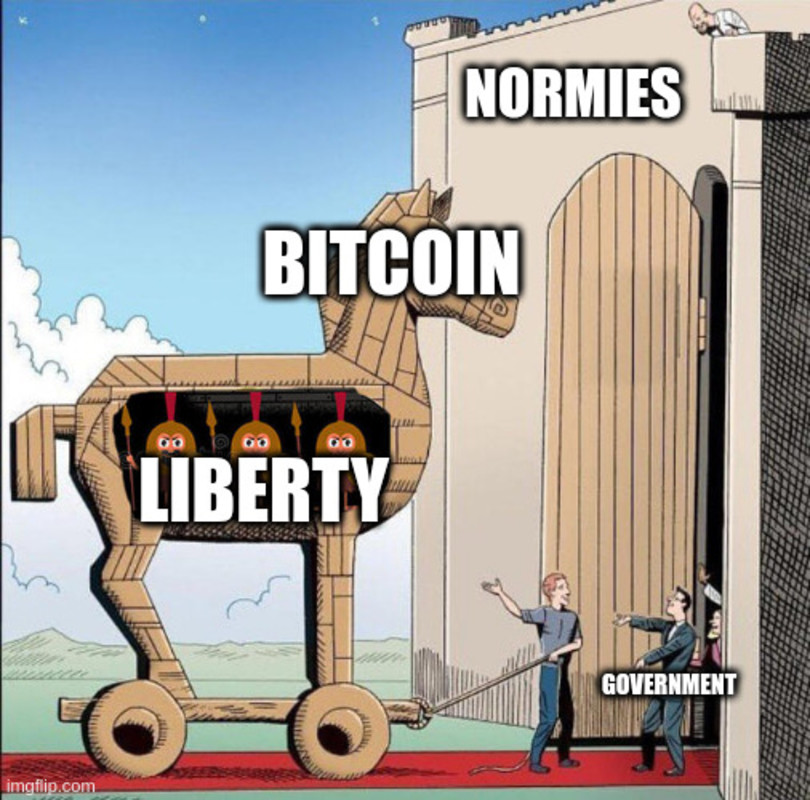Expanding Freedom: Bitcoin’s Tension Between Ideology and Adoption

Since its founding 15 years ago, Bitcoin has captured the imagination of libertarians, anarchists, and advocates of individual freedom and financial sovereignty. For them, Bitcoin represented a revolutionary challenge to state-controlled money and authority. It has therefore come to symbolize the disruptive shift towards greater freedom and autonomy of the individual in modern society.
But there are growing signs that Bitcoin may be losing its revolutionary roots as it gains mainstream traction. Exponential growth in users and market value coincides with a dilution of the freedom-oriented spirit that initially defined the technology. In the hyperbitcoinized world of the future, will Bitcoin still be able to embody the libertarian ideals that generated so much excitement among its early supporters? Or will it become just another compliant financial asset absorbed into the existing global monetary order?
This question goes beyond philosophical debates about cryptocurrency anarchism and speaks to the practical decisions developers, miners, and users will face over the next decade of Bitcoin. There is a difficult trade-off between the cypherpunk vision of complete financial freedom and the compromises necessary for scalability. These choices will determine whether Bitcoin realizes its destructive potential or succumbs to the government forces it originally sought to avoid.
In modern society, adopting a liberal way of thinking is often considered radical, as opposed to mainstream accepted opinion (a view accepted by many within the liberal community). The dominant challenge lies in the widespread acceptance of the myth of statism, a well-established belief system that freedom advocates conscientiously confront. Despite the enormous nature of this challenge, many libertarians remain committed to advancing freedom through a variety of strategic initiatives. Their joint efforts aim not only to challenge the status quo, but also to promote fundamental changes in societal attitudes towards freedom.
The fight against widespread acceptance of nationalism is an ongoing journey, and as committed advocates, they recognize the need for a multifaceted approach. From engaging in public discourse to fostering educational initiatives, their efforts are rooted in the conviction that the principles of freedom are essential to a thriving society. This commitment includes a shared vision for a future where individual freedoms are respected and maintained across ideological boundaries.
As a freedom advocate, the discovery of Bitcoin was a pivotal moment for me. As I began my journey down the rabbit hole, I couldn’t help but feel a rush of excitement about the project. These cryptographic protocols have provided a cunning workaround for separating money from the state, giving us new practical ways to promote freedom in our lifetimes. Bitcoin embodies the principles of individual sovereignty and financial autonomy. It has become a beacon for those seeking alternatives to the country’s oppressive, centralized system.

The concept behind the meme “Bitcoin is a Trojan horse for freedom” resonated deeply. It suggests that individuals who were previously indifferent to the principles of freedom may unknowingly embrace them as they pursue personal financial gain through Bitcoin. The idea that “number-rising” technology is essentially a covert “free-rising technology” has highlighted Bitcoin’s transformative potential in the larger context of promoting individual freedom and challenging traditional power structures. This aspect added another layer of significance to my perception of Bitcoin’s role as a revolutionary force within the broader freedom movement.
Bitcoin has demonstrated the ability to empower individuals by bypassing authoritarian regimes. Organizations such as the Human Rights Foundation and Oslo Freedom Forum have effectively highlighted personal stories of how Bitcoin has positively transformed lives around the world. This gave people the ability to engage in transactions using their currency without government devaluation and censorship. These sentiments are echoed within the Bitcoin community today, expressed through slogans such as “Not keys or coins,” “Be your own bank,” and “We separate money from the state!” There is a wealth of educational content dedicated to promoting these principles and emphasizing the increased freedoms that come with monetary sovereignty.
Bitcoin also enhances personal freedom by giving individuals with the ability to save the ability to store their value in savings technologies that are not subject to government fiat Ponzi schemes. Individuals can exchange for currencies that cannot be censored by governments, providing a secure and censorship-resistant medium for financial transactions. While these achievements are noteworthy and deserve recognition, there is an inconvenient truth that often goes undiscussed or even ignored: the challenge of scaling the number of sovereign users on a network.
As you delve deeper into the world of Bitcoin, you will increasingly adopt a technical perspective. Some people find this understanding intuitive, but others may encounter difficulties. Nonetheless, we will eventually face the reality of blockchain scalability. Due to block size limitations, there is a transaction throughput limit for each new block. The consensus solution adopted by the network was a layered scaling approach. Meet the Lightning Network, a second layer solution designed to improve the economic density of on-chain transactions. This allows two parties to participate in a multi-signature channel, enabling multiple payments for each of several essential on-chain transactions, including opening, connecting, and closing channels. Despite challenges such as liquidity management and online requirements, this engineering feat greatly expands the network’s transaction processing capabilities with virtually no limits. The only problem is that most users will need an administrator.
Despite the current Lightning Network implementation, there are still limits to the number of sovereign users the network can accommodate. Despite improvements in payment scale, the Bitcoin network only supports 10 to 100 million sovereign users, whether individuals, single custodians, or federated custodians implementing the eCash system, updating their Lightning channels several times a year. can. In the HyperBitcoin world, where over 8 billion people live, the implications are easy to grasp. The inconvenient reality is that less than 1% of the world’s population can use Bitcoin in a sovereign way.
Achieving sovereignty with Bitcoin requires having exclusive control over UTXOs. Expanding the number of sovereign users on the network will require additional engineering effort and consensus changes. It is important to establish trust-minimizing mechanisms to allow users to share UTXOs and resolve disputes over partial UTXO ownership without imposing excessive economic costs for resolution. There is currently discussion within the development community about how activation protocols can begin to solve these problems, and in particular how CTV can help scale Bitcoin as an early building block for solutions to these sovereignty expansion problems. It is in progress.
The seriousness and urgency of this problem reminds us once again how much you value the principle of separating money from the state. We are at a pivotal point in pondering the process and significance of what a world fully immersed in hyperbitcoinization actually entails. Without intervention, we could find ourselves in a future where 99% of the population will require some form of custodianship to navigate the complexities of the Bitcoin network.
These potential scenarios raise legitimate concerns that states could potentially exercise control over networks in the future. The question of urgency becomes paramount. While I refrain from advocating reckless behavior and hasty execution, I have a feeling that a metaphorical window of opportunity is upon us.
Looking back at Bitcoin’s history, it becomes clear that as the network expands, enabling consensus changes to the network becomes increasingly difficult. As networks grow, complexity arises, making it exponentially more difficult to convince an overwhelming majority to accept protocol upgrades unless there is massive demand for such changes. This nuanced perspective highlights the need to carefully and quickly consider Bitcoin’s evolving ecosystem dynamics.
My concern is about the urgent need for the majority of participants to truly value individual freedom and recognize its importance in implementing important upgrades and solving widespread scaling issues. Entering the Bitcoin space from a libertarian perspective, I am painfully aware of the lack of respect for freedom by the majority of society. There is a real fear that Bitcoin, initially a cornerstone of the freedom movement, may gradually lose its essence and become just another financial asset. At first gradually, then suddenly.
Facing current reality requires a pragmatic perspective and an acceptance of reality as it is rather than wishful thinking. To those of you who share my concerns, I passionately implore you to remain firmly grounded and unwavering in your commitment to upholding individual freedom. Accept with real confidence that Bitcoin will play a pivotal role in advancing this purpose. The road ahead is difficult and requires a united effort deeply connected to our common purpose. Let us tackle the challenge of expanding sovereignty with sincerity, fully aware of the important work that lies ahead. Each of us has a unique and essential role in this organic endeavor. Let us embrace this with true strength and unwavering determination.
This is a guest post by Michael Matulef. The opinions expressed are solely personal and do not necessarily reflect the opinions of BTC Inc or Bitcoin Magazine.



